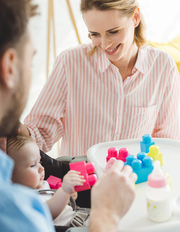How to Choose the Perfect Outfit for Your Baby’s First Photoshoot
A baby’s first photoshoot always lights up the excitement in new parents’ minds. From hiring the best photographer in town and choosing the best theme to get the baby clothes, every task seems daunting. The little snuggly baby wants to be comfortable in whatever they are wearing. You must not make any mistake while shopping for the baby’s first photoshoot.
More than one session of outfit changes irritate the baby and ruin their mood during the entire photoshoot. You will never want to end up in a chaotic photoshoot where the baby is throwing tantrums. This article is a guide about how you can choose the perfect outfits for your baby’s photoshoot. Let’s dive in to learn more.
Tips for Getting the Perfect Outfits for Your Baby’s First Photoshoot
The best part of choosing baby clothes is that there is no hard and fast rule on what you choose. Whether you want to go with a theme relevant to the approaching event as many people do the baby photoshoot at Halloween to show their creativity or you want to simply capture the little one, everything is in your hands and you can do whatever you want. However, here are some suggestions regarding the selection of clothes for the photoshoot so it all ends up in the smooth way you want.
● Simple is Wonderful
The star of the photoshoot is the baby, not the clothes they are wearing. So, never try to go for the clothes that divert the limelight from the baby. The clothes with big images, writings, or funky patterns are not suitable for the baby’s photoshoot. Go for solid and basic colors like a white onesie with exquisite patterns that complement the delicate nature of the children.
● Watch the Weather
A cranky baby is not the one with whom you want to get through the photoshoot sessions. Once the baby is irritated, you will not see that little smile in the photos. So, while you are choosing the clothes, make sure that the temperature at the photoshoot area is comfortable for the baby especially if you are going for the sleeveless onesie in winter. Turn up the heating so the baby gets comfortable in that clothes.
● Don’t Drown Them with Layers
Layering is not a good way of creating an adorable outfit for the baby as while changing the postures, you may have to go with the endless times of tucking back the clothes that become irritating for the baby, you, and the photographer especially when you have booked a limited time slot for that baby’s photoshoot. Never drown the baby in the layers. However, we recommend you go for the one-piece outfits. If you have planned for the jumpers etc where you have to do a little bit of layering, get something fitting so it does not irritate the baby.
Image Source: Freepik
● Show Some Skin
In the case of the baby photo shoot, you are creating adorable memories to look back on once your little one is grown up. Later, you will want to look at the little hands and feet of the baby and recall the growth journey your baby has been through. Hence, never get clothes that cover them completely like a footed onesie. Show some skin. Many parents opt for an indoor photoshoot where the temperature is controlled. So, you can get some sleeveless shirts, bodysuits, overalls, etc that do not hide them.
● Accessorize Smartly
The biggest mistake parents make while getting their baby ready for its first photoshoot is to couple the outfit with oversized or too many accessories like a large bow or big headband. Such accessories dominate the look of the baby and when you see the picture, you are unable to see the little face of your baby. You should never be repeating this mistake. Get something like a bonnet or a hat in complementary colors with the clothes, not the same, that adds a subtle look to the baby.
Final Words
In conclusion, choosing the baby boy or girl clothes for your child’s first photoshoot is a careful choice to make. You can get the best suggestions from the above tips to make the right choice for the clothes. However, the only thing you need to ensure is that nothing on the baby should be dominating the little one. Choose the solid colors with the subtle accessories and your baby will be ready for its first photo session.











